Un extraño país familiar
Mi primer día en Yemen, el pescado fresco del mar arábigo y una valija azul.
Si querés escuchar esta publicación, acá te dejo la grabación.
Me despertó el olor penetrante a comida muy especiada y Biko preguntándome si quería almorzar.
−No tengo hambre todavía −le respondí sin abrir los ojos y me volví a dormir.
Habíamos salido muy temprano del Cairo esa mañana y las tres horas de sueño en el hotel del aeropuerto no habían sido suficientes. Biko y su hermana eran mis acompañantes en la fila de tres asientos en el vuelo de Egipto a Yemen. Yo había pedido la ventanilla porque estaba decidida a ver el rio Nilo desde el aire, pero el calor y la falta de sueño me vencieron y me quedé dormida antes de despegar.
Cuando abrí los ojos de nuevo, lo primero que vi fue una autopista angostísima con agua a los dos lados. Estábamos aterrizando en Aden, al sur de Yemen, y más tarde Biko me explicó que esa autopista conecta las dos partes de la ciudad. Era mi primera vez en un país árabe, la primera vez que usaba hijab para cubrirme el pelo, y la primera vez que iba a conocer a la familia de Biko en persona. Después de tantas videollamadas estaba entusiasmada pero también nerviosa por conocerlos. ¿Quién no lo estaría?
El aeropuerto de Aden es chico y bajamos del avión por una escalera metálica directamente a la pista. Cuando bajé el primer escalón, el contraste entre el aire acondicionado del avión y el calor, la humedad, y el sol del mediodía de Aden fue tan grande que se me despertaron todos los sentidos en el mismo instante. Estábamos en Yemen, un país que hacía cinco años no sabía que existía. Un país que en cinco años había pasado de ser un completo extraño a transformarse en una parte central en mi vida cotidiana. De a poco, la comida yemení se había incorporado a mi dieta, había aprendido a bailar la música tradicional, y me había vuelto fanática del té fuerte y dulce que preparaban nuestros amigos después de la cena.
No me acuerdo cuántos minutos caminamos desde la escalera del avión hasta el edificio donde hicimos migraciones. Mis recuerdos después de tres años son como escenas inconexas de una película incompleta. Caprichosamente mi memoria ha elegido qué recuerdos conservar, utilizando un criterio de selección completamente desconocido para mí. Antes de que mi memoria decida excluir algunos más, creo que es buena idea dejarlos por escrito, por si acaso.
Lo próximo que recuerdo es que el oficial de migraciones del aeropuerto no me prestó ni la más mínima atención. Biko le dio los tres pasaportes y le explicó que viajaba con su hermana y su esposa. No podía saber lo que decían en árabe. Además de As-salamu alaikum para saludar y shukran para decir gracias, mis conocimientos para ese momento incluían solamente un puñado de palabras que suenan casi igual al español: azúcar, aceite, camisa, pantalón.1 Reconocí cuando Biko dijo argentiniia estirando la última i y le señaló la página del pasaporte donde estaba estampada mi visa. Sin mirarme ni hablarme, el oficial de migraciones le devolvió los pasaportes y nos dio la bienvenida.
Al otro lado, nos esperaban el hermano y el sobrino más chico. No hizo falta que Biko me los señalara ni que tuvieran un cartel. La emoción de su sobrino cuando nos vio fue suficiente para reconocerlos instantáneamente. Estaba contento de ver a sus tíos, pero fascinado al comprobar que yo era una persona de carne y hueso, que existía también fuera del teléfono.
−Tu habitación es hermosa −me dijo cuando nos subimos al auto, entre todas las palabras en inglés que sabía y quería practicar conmigo.
Llegamos a la casa y más de una decena de brazos nos abrazaron al mismo tiempo. El encuentro físico después de tan larga espera hizo que todos nos olvidáramos del calor, que en el verano en Aden puede superar los 40 grados. Nunca estoy segura cuántos besos hay que dar. Entre mujeres árabes son varios, uno atrás de otro y en el mismo cachete. Ese día perdí la cuenta y me dejé guiar por las expertas.
−Muá, bienvenida, muá, ¿cómo estás?, muá, ¿cómo fue el viaje?, muá −me decían todas entre beso y beso.
El sobrino de Biko tenía razón. Nuestra habitación era hermosa y preparada con todo el amor del mundo. Cortinas pesadas para bloquear el sol y el calor del verano, luz cálida y aroma a bakhur, un incienso típico en Yemen. Nosotros estábamos encantados y agradecidos con la sorpresa. Era un hermoso gesto de bienvenida y todos se alegraron de que nos gustara. El que no parecía contento era el sobrino y confundida pregunté por qué. La hermana me explicó entre risas que nos querían dejar descansar y acomodar las valijas, pero el sobrino se quería quedar jugando con nosotros. Lo tranquilizamos afirmándole que nos íbamos a quedar un mes. Tendríamos un montón de tiempo para compartir.
Era lunes 10 de mayo y quedaban dos días de Ramadán, un mes sagrado para los musulmanes. Ramadán es el noveno mes en el calendario lunar islámico y se ayuna desde el alba hasta el anochecer. Durante Ramadán es como si las rutinas se invirtiesen. La gente anda somnolienta durante el día, el trabajo empieza más tarde y las siestas son más largas. Cuando cae el sol, y se rompe el ayuno, la ciudad se despierta, se visita a las amistades y a los parientes, y los negocios maximizan sus ventas hasta el amanecer.
En la casa de Biko, la familia se reunió nuevamente en el comedor a la tardecita. Después de comer dátiles, la fruta perfecta luego de tantas horas de ayuno, compartimos falafel, bombas de papa, sambusas que se parecen a las empanadas, y sopa de trigo y carne de cordero.
−¿Cuál es tu comida yemení favorita? −me preguntó la hermana de Biko.
−Sayadía −respondí sin dudas. Un plato parecido al arroz con pollo, pero en lugar de pollo lleva atún fresco en trozos. Una delicia.
Ahora sí estábamos todos con energías para charlar, y Biko y sus hermanos oficiaron de intérpretes para que nadie se perdiera nada. Entre historias familiares y anécdotas sobre el día que nos casamos por civil en Nueva Jersey, que toda la familia había visto en vivo por Instagram, llegó la hora de los regalos. Me atrevo a decir que los presentes estadounidenses y los alfajores argentinos que habíamos llevado se sintieron avergonzados cuando la hermana de Biko apareció en el comedor con una valija azul.
−For you −me dijo tímida en inglés y todos se quedaron en silencio, expectantes.
Lo miré a Biko suplicando ayuda, ¿qué significaba la valija? Pero se limitó a sonreírme.
Abrí la valija azul sin saber qué esperar. Vestidos para fiestas y vestidos para estar cómoda en la casa; pantuflas, ojotas y pijamas; una cadenita y aritos de oro; más alhajas para fiestas; bakhur, cremas y perfumes hechos a mano por las mujeres de la familia. Era un ajuar. Un ajuar precioso. Ni gracias, ni shukran, ni thank you podían alcanzar para agradecerles. Pero en esos momentos de felicidad, los ojos y la sonrisa suelen ser suficientes para transmitir gratitud y no hicieron falta los traductores.
La charla siguió por algunas horas hasta que los que estaban sentados más cerca de la cocina interrumpieron con un grito de festejo. Las sobrinas entraron al comedor con dos bandejas redondas gigantes. Era sayadía. ¡Y yo que pensaba que ya me habían dado todas las sorpresas!
Que me perdonen nuestros amigos en Estados Unidos. Hacen una sayadía riquísima. Pero la de esa noche no tenía comparación. Aden está en la costa del mar arábigo y el pescado fresco es un ingrediente principal de la cocina de la zona. Se le suman al menú todos los vegetales frescos de productores locales, que la experiencia milenaria transforma en platos que son un manjar.
A la cena la siguió una sobremesa que terminó de madrugada, pero nadie quería irse a dormir. Biko estaba ansioso por mostrarme la ciudad. A la noche no refresca mucho, pero unos grados menos que en el día hacen que sea el horario perfecto para los paseos. Los sobrinos definieron la ruta y las sobrinas, la música. Salimos a recorrer. Paseamos por la calle principal, vimos el Castillo de Sira en la cima de la colina, y la última parada fue la playa, justo antes del amanecer. No éramos los únicos. Un grupo de nenes jugaba a la pelota mientras los padres conversaban sentados en el murallón de piedra y un grupo de mujeres se mojaba los pies en el agua.
El auto, la música, las carcajadas, la arena, los chicos con la pelota. Una imagen familiar. Bien podría haber sido una escena en la laguna de Junín, mi ciudad natal. O en cualquier otro lugar del mundo. Pero me recordé que estaba en Aden. En Yemen. Un país extraño que empezaba a conocer. A las orillas de un mar que veía por primera vez.
Si te gusto la publicación de este fin de semana, y te parece que a alguien que conocés le puede gustar también, podés compartísela con el botón de acá abajo.
Si todavía no te suscribiste y querés seguir leyendo sobre mi viaje a Yemen, podés sumarte a La Platypus acá. Es una publicación gratuita y te llega un correo mío todos los fines de semana.
Gracias por leerme.
Hasta el fin de semana que viene.
Pia.
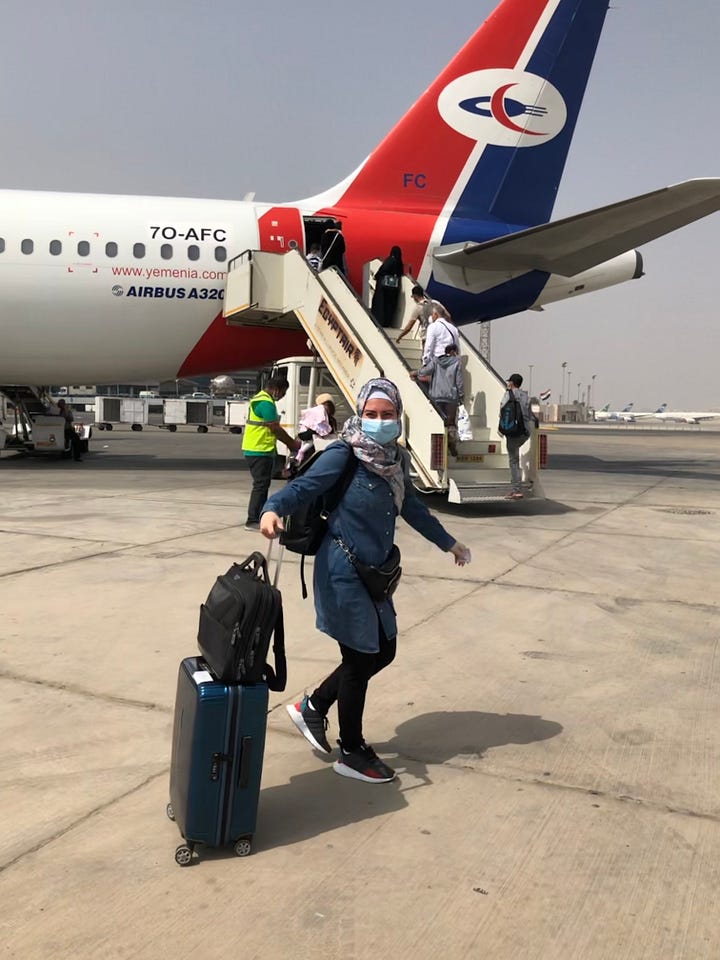
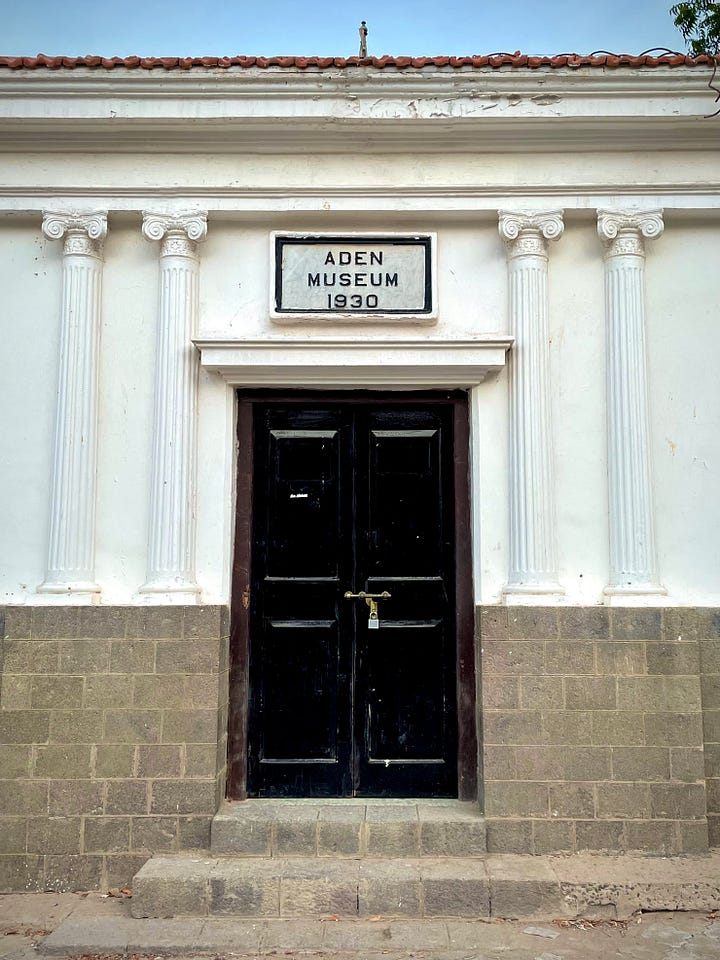
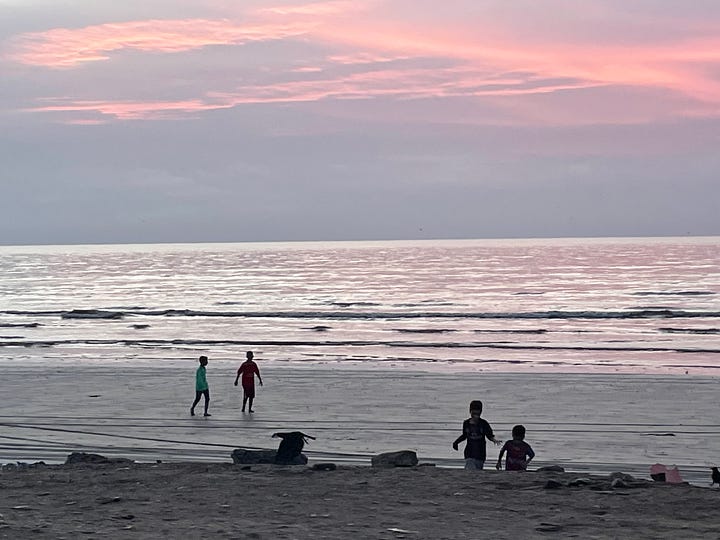
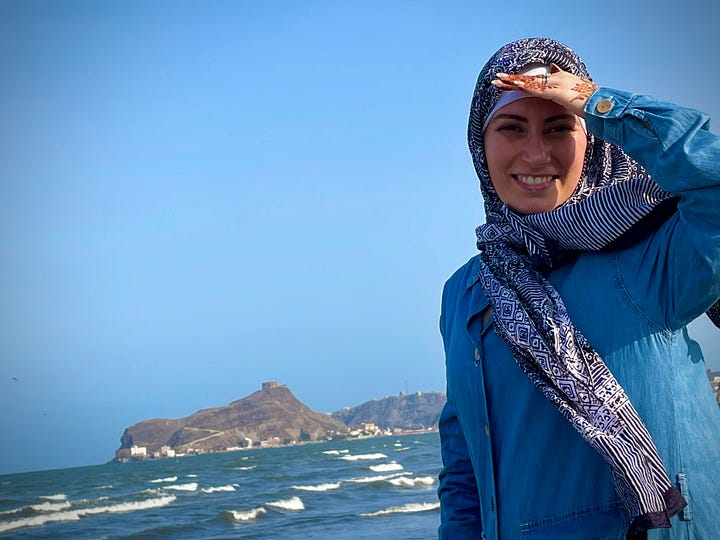
A Familiar Strange Country
I was awakened by the strong smell of aromatic spices and Biko’s voice asking me if I wanted to have lunch. “I’m not hungry yet,” I replied without opening my eyes and fell back to sleep.
We had left very early in the morning from Cairo and the three hours of sleep at the airport hotel had not been enough. Biko and his sister were my companions in the three-seat row on the flight from Egypt to Yemen. I had called dibs on the window seat because I was determined to see the Nile from the air, but the heat and lack of sleep had won the battle and I had fallen asleep before taking off.
When I opened my eyes again, I saw a highway with water on both sides. We were landing in Aden, in the south of Yemen, and later Biko explained this highway connects both sides of the city. It was my first time in an Arab country, my first time wearing a hijab, and my first time meeting Biko’s family. After so many video calls I was excited to meet them, but I was also nervous. Who wouldn’t be?
Aden’s airport is small, and we got off the plane from a metal staircase directly to the runway. When I took the first step down, the contrast between the AC on the plane and the heat, humidity, and midday Adeni sunshine was so abrupt that all my senses were awakened in an instant. We were in Yemen, a country that five years before, I didn’t know existed. A country that within five years had turned from a complete stranger to an integral part of my life. Slowly, Yemeni food had become part of my diet, I had learned the traditional dance, and I had become a fan of the strong and sweet tea our friends would prepare after dinner.
I don’t remember how long it took us from the runway to the building where we did customs. After three years, my memories of that day are like disconnected scenes of an incomplete old movie reel. My memory has unilaterally chosen which scenes to keep, using a selection criterion unknown to me. So, before my memory decides to delete some more, I think it’s a good idea to write them down, just in case.
The next thing I remember is the immigration officer, who didn’t pay me the slightest attention. Biko gave him our passports and explained he was traveling with his sister and wife. I couldn’t follow the conversation in Arabic. Other than As-salamu alaikum to say hello and shukran to say thank you, my knowledge of Arabic was limited to a bunch of words that sound the same in Arabic and Spanish, due to the Muslim ruling in the Spanish peninsula from the 8th to the 15th centuries.2 I heard Biko saying Argentiniia, stretching the last i, and showing the officer the passport page where my visa was stamped. Without looking at me, the officer gave him the passports back and mumbled “welcome” in English.
In the arrival section of the airport, Biko’s brother and nephew were waiting for us. The eight-year-old boy's excitement when he saw us was enough for me to spot them in a second. He was happy to see his uncle and aunt, but thrilled to confirm I was a real-life person, who also existed outside the cell phone.
“Your bedroom is beautiful”, he told me when we got in the car, mixed with all the other words he knew in English and wanted to practice with me.
When we arrived at the family house, a dozen arms hugged us at the same time. The physical encounter after such a long wait made us all forget about the heat, that in Aden can get up to 104 degrees Fahrenheit. I never know how many kisses to give. Among Arab women, you are expected to kiss repeatedly on the same cheek, but there is no clear rule on how many. That day, I lost count, and I followed the lead of the experts. “Muah; welcome; muah; how are you? muah; how was the flight?”
Biko’s nephew was right. Our bedroom was beautiful, and we could tell they had taken care of every detail with great love. Heavy curtains to block the sun and heat of the Adeni summer, warm light, and the delicate scent of bakhur, a typical incense in Yemen. We were delighted with the surprise, and everyone was happy we liked it. Biko’s nephew seemed upset though. I was confused. What was wrong? His mum explained they wanted to let us rest and arrange the luggage, but he wanted to stay and play with us. We reassured him we were staying for a month. We’d have plenty of time to spend together.
It was Monday, May 10, and there were two days left of Ramadan, the sacred month for Islam. Ramadan is the ninth month in the lunar year and Muslims fast from dawn to dusk. During Ramadan, daily routines get flipped. People are drowsy during the day, work starts later, and afternoon naps are longer. At sunset when people break the fast, the city wakes up. After iftar, the first meal of the day, people go visit relatives and friends, and shops maximize their sales until dawn.
By the evening, we all gathered in the dining room and broke the fast with dates, before sharing falafel, sambusa, and soup made of wheat and lamb. “What’s your favorite Yemeni food?” Biko’s sister asked me. “Sayadia”, I replied without hesitation. A rice and tuna dish that tastes like heaven. I think it’s accurate to say it’s my favorite food, of all, and delete the word Yemeni from the sentence. The family applauded my answer and laughed.
Now we all had more energy to chat, and Biko and his siblings accepted their role as interpreters so no one would miss a word. Among family anecdotes and the retelling of our wedding day in New Jersey, which the whole family had seen live on Instagram, it was time for presents. It seemed to me that the American gifts and the Argentinian sweets we had brought felt embarrassed when the door opened and the blue suitcase, carried by Biko’s sister, made its entrance to the dining room. “For you”, she shyly whispered in English, and the room went silent, holding their breath, waiting for my reaction.
My eyes reached for Biko, begging for help. What did the suitcase mean? But he was only willing to offer a smile back.
I opened the suitcase without knowing what to expect. Night and casual dresses; sandals, slippers, and pajamas; a gold neckless and hearings; more jewelry for parties; bakhur, creams, and perfumes, all handmade by the women in the family. It was a trousseau. A gorgeous trousseau. No thank you, gracias, or shukran would do justice to what I wanted to say. I had no words. But I guess in those moments of blissfulness, the look in one's eyes and the jubilant smile are enough to convey pure gratitude and there was no need for translation.
The conversation continued for a few hours until those closer to the kitchen interrupted it with a loud cheer. Biko’s nieces carefully placed two giant round plates on the sufra, like a tablecloth for the floor. It was sayadia. Just when I thought there were no more surprises left that day!
I hope our Yemeni friends in the U.S. can forgive me. They make delicious sayadia. But the one we had that night was unmatchable. Aden rests by the shores of the Arab sea and fresh fish is one of the main ingredients in the Adeni cuisine. Add locally grown vegetables to the menu, combine all ingredients with ancient traditions, and the result is a delicacy.
Anyone would think the day had been eventful enough, but we were not ready to go to bed yet. Biko was eager to show me the city. The temperature doesn’t drop much during the night, but a few degrees down makes the night the best time to go out. Biko’s nephews decided on the route and his nieces chose the music. We rode the Ma’lla main street, a Manhattan-like avenue, and saw the Sira Castle on top of the hill. The beach of Sahel Abyan was our last stop, just before sunrise. We weren’t the only ones. A bunch of kids were playing with a ball while their parents sat on the stone wall, and a group of women were getting their feet wet in the cool morning sea.
The car, the music, the laugh, the sand, the kids playing ball. It was so familiar. It could have easily been a scene at the lagoon in Junin, my hometown. Or anywhere else in the world. I reminded myself that I was in Aden. I was in Yemen. A strange country I was slowly getting to know more. At the shore of a sea I was seeing for the first time.
If you’ve enjoyed this post, you can share it with others who you think might enjoy it too.
If you haven’t subscribed yet and would like to read more about my trip to Yemen, you can subscribe below. I share a new story every weekend.
See you next weekend!
Pia
El árabe y el español tienen mucho más en común de lo que te podés imaginar. Te super recomiendo este video de la BBC para entender mejor por qué. ¿Mi arabismo favorito? La palabra fulano.
If you love history as much as I do, don’t miss this article about the influence of Arabic on the Spanish Language. Did you know that about 4,000 words of modern Spanish come from Arabic?!

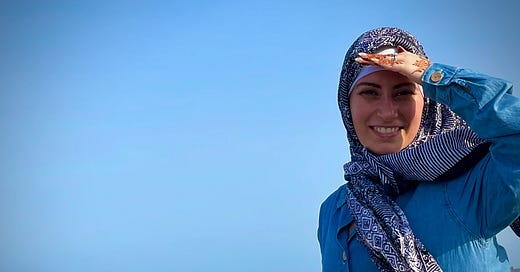


I’ve enjoyed every single moment of it. You’ve set the scene perfectly. The "Muah" part really got me 😂.